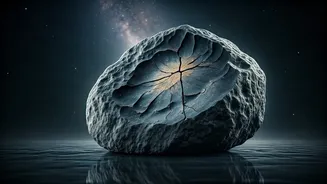Ancient Water Flows
Analysis of the Ryugu samples has indicated that water flowed on the asteroid for an extended period, approximately one billion years. This discovery suggests
that Ryugu, a carbonaceous chondrite asteroid, once possessed the necessary conditions to support water activity. The presence of water is significant because it's a critical component for life as we know it. These water-related findings underscore the idea that asteroids might have played a role in delivering water to early Earth, which would have been pivotal for the development of life. The evidence of water flow also presents clues about the geological processes that shaped Ryugu's surface and interior. Investigating the nature of this water, its composition, and its interactions with the asteroid's materials can reveal valuable details about the conditions present during the formation of our solar system and the potential for similar conditions on other celestial bodies.
Dust Grains Unveiled
The Ryugu samples contained dust grains that predate the formation of our solar system. This means that some of the materials making up the asteroid are even older than the Sun and the planets. These ancient dust grains were likely forged in the hearts of dying stars or in the interstellar medium before the solar system even existed. The discovery indicates that materials from outside the solar system were incorporated into the formation of asteroids like Ryugu. By studying these presolar grains, scientists can gain insights into the processes of stellar evolution and the environments where these elements were created. This is a significant finding because it provides a direct link to the materials that seeded the solar system, potentially influencing the composition of the early Earth and contributing to the building blocks of life. These grains offer a unique window into the cosmic history of our universe.
Life’s Building Blocks
The research on Ryugu samples has revealed crucial information about the presence of organic compounds, which are often considered the building blocks of life. These organic materials are complex carbon-based molecules that can form the basis for creating the essential biochemical reactions that lead to the formation of life. The fact that organic matter exists on an asteroid like Ryugu raises the possibility that these compounds could have been delivered to Earth through asteroid impacts in the past. If the building blocks of life came from space, as these findings suggest, it provides another layer of support to the idea that life itself originated from non-terrestrial sources. This is relevant to understanding how life emerged on Earth, and it also has implications for the search for life elsewhere in the universe. Scientists are investigating the types and amounts of organic materials discovered on Ryugu. This will allow them to compare them to organic compounds found in other meteorites and analyze the conditions that might have favored their formation and preservation.















